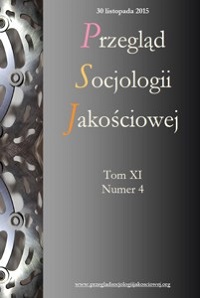Czy brak naturalizacji wyklucza nową tożsamość narodową? Konstruowanie tożsamości w narracjach wieloletnich imigrantów bez obywatelstwa polskiego
DOI:
https://doi.org/10.18778/1733-8069.11.4.06Słowa kluczowe:
denizeni, imigranci osiedleńczy, tożsamość narracyjna, obywatelstwo, brak naturalizacjiAbstrakt
Artykuł opisuje narracyjne konstruowanie tożsamości przez osiadłych w Polsce wieloletnich imigrantów, którzy spełniają kryteria naturalizacji, ale nie chcą starać się o obywatelstwo państwa przyjmującego. Wśród przyczyn rezygnacji z polskiego obywatelstwa najczęściej wymieniają uzyskanie statusu pośredniego (karty stałego pobytu), a także zakaz posiadania podwójnego obywatelstwa w państwie pochodzenia oraz trudności biurokratyczne towarzyszące naturalizacji w Polsce. Nie wyklucza to jednak nowej tożsamości narodowej związanej z krajem przyjmującym. Status i doświadczenia biograficzne badanych nie wspierają stabilnej, statycznej wizji przynależności narodowej. W narracjach denizenów to kompetencje kulturowe oraz okres pobytu w danym kraju ujmowane są jako czynniki kształtujące tożsamość i przywiązanie do państwa wysyłającego lub przyjmującego. Bycie na emigracji, nawet wieloletniej i osiedleńczej, oznacza jednak stałe negocjowanie pomiędzy utożsamianiem się z krajem pochodzenia a nową tożsamością wynikającą z zakorzenienia w społeczeństwie przyjmującym.
Pobrania
Bibliografia
Bauböck Rainer (1994) Transnational Citizenship. Membership and Rights in International Migration. Aldershot: Edward Elgar Publishing.
Google Scholar
Bauböck Rainer (2002) How Migration Transforms Citizenship: International, Multinational and Transnational Perspectives. IWE Working paper 24/2002 [dostęp 16 października 2015 r.]. Dostępny w Internecie https://eif.univie.ac.at/downloads/workingpapers/IWE-Papers/WP24.pdf
Google Scholar
Benton Meghan (2010) A Theory of Denizenship. London: University College London [dostęp 16 października 2015 r.]. Dostępny w Internecie http://discovery.ucl.ac.uk/624490/1/624490.pdf
Google Scholar
Bevelander Pieter, Veenman Justus (2006) Naturalisation and Socioeconomic Integration: The Case of the Netherlands. IZA Discussion Paper no. 2153 [dostęp 16 października 2015 r.]. Dostępny w Internecie http://ftp.iza.org/dp2153.pdf
Google Scholar
DOI: https://doi.org/10.2139/ssrn.908239
Blumenthal Sonia D. (1971) The Private Organizations in the Naturalization and Citizenship Process. „International Migration Review”, vol. 5, no. 4, s. 448‒462.
Google Scholar
DOI: https://doi.org/10.2307/3002146
Brubaker Rogers (1989) Membership Without Citizenship: The Economic and Social Rights of Noncitizens [w:] tenże, Immigration and the Politics of Citizenship in Europe and North America. New York: University Press of America, s. 145–162.
Google Scholar
Castles Stephen, Davidson Alastair (2000) Citizenship and Migration. Globalization and the Politics of Belonging. London: Macmillan Press.
Google Scholar
Dronkers Jaap, Vink Maarten Peter (2012) Explaining Access to Citizenship in Europe: How Citizenship Policies Affect Naturalization Rates. „European Union Politics”, vol. 13, no. 3, s. 390‒412.
Google Scholar
DOI: https://doi.org/10.1177/1465116512440510
Escobar Cristina (2004) Dual Citizenship and Political Participation: Migrants in the Interplay of United States and Colombian Politics. „Latino Studies”, vol. 2, no. 1, s. 45‒69.
Google Scholar
DOI: https://doi.org/10.1057/palgrave.lst.8600060
Freeman Gary P., Ögelman Nedim (1998) Homeland Citizenship Policies and the Status of Third Country Nationals in the European Union. „Journal of Ethnic and Migration Studies”, vol. 24, no. 4, s. 769–688.
Google Scholar
DOI: https://doi.org/10.1080/1369183X.1998.9976665
Garcia John A. (1981) Political Integration of Mexican Immigrants: Explorations Into the Naturalization Process. „International Migration Review”, vol. 15, no. 4, s. 608‒625.
Google Scholar
DOI: https://doi.org/10.1177/019791838101500401
Glick Schiller Nina, Basch Linda, Blanc Szanton Cristina (1995) From immigrant to transmigrant: theorizing transnational migration, “Anthropology Quarterly”, vol. 68, s. 48–63.
Google Scholar
DOI: https://doi.org/10.2307/3317464
Glick Schiller Nina, Salazar Noel B. (2013) Regimes of Mobility Across the Globe. „Journal of Ethnic and Migration Studies”, vol. 39, no. 2, s. 183‒200.
Google Scholar
DOI: https://doi.org/10.1080/1369183X.2013.723253
Grzymała-Kazłowska Aleksandra (2013) Zarys koncepcji społecznego zakotwiczenia. Inne spojrzenie na tożsamość, adaptację i integrację imigrantów. „Kultura i Społeczeństwo”, t. 57, nr 3, s. 45–60.
Google Scholar
DOI: https://doi.org/10.2478/kultura-2013-0022
Hammar Tomas (1990) Democracy and the Nation State: Aliens, Denizens, and Citizens in a World of International Migration. Aldershot: Avebury.
Google Scholar
Jones-Correa Michael (2001) Under Two Flags: Dual Nationality in Latin America and Its Consequences for Naturalization in the United States. „International Migration Review”, vol. 35, no. 4, s. 997–1029.
Google Scholar
DOI: https://doi.org/10.1111/j.1747-7379.2001.tb00050.x
Martiniello Marco (1994) Citizenship of the European Union. A Critical View [w:] Rainer Bauböck, ed., From Aliens to Citizens. Redefining the Status of Immigrants in Europe. Vienna: Avebury, s. 29‒48.
Google Scholar
Mazzolari Francesca (2009) Dual Citizenship Rights: Do They Make More and Richer Citizens? „Demography”, vol. 46, no. 1, s. 169–191.
Google Scholar
DOI: https://doi.org/10.1353/dem.0.0038
Neuman Gerlad L. (2001) Nationality Law in the United States and the Federal Republic of Germany: Structure and Current Problems [w:] Peter H. Schuck, Rainer Münz, eds., Paths to Inclusion: The Integration of Migrants in the United States and Germany. New York–Oxford: Berghahn Books, s. 247–298.
Google Scholar
Portes Alejandro, Curtis John W. (1987) Changing Flags: Naturalization and Its Determinants Among Mexican Immigrants. „International Migration Review”, vol. 21, no. 2, s. 352‒371.
Google Scholar
DOI: https://doi.org/10.1177/019791838702100206
Portes Alejandro, Guarnizo Luis E., Landolt Patricia (1999) The Study of Transnationalism: Pitfalls and Promise of an Emergent Research Field. „Ethnic and Racial Studies”, vol. 22, no. 2, s. 217‒237.
Google Scholar
DOI: https://doi.org/10.1080/014198799329468
Schuck Peter (1989) Membership in the Liberal Polity: The Devaluation of American Citizenship, “Georgetown Immigration Law Journal”, vol. 3, issue 1, ss. 1-18.
Google Scholar
Schuck Peter H., Münz Rainer, eds. (2001) Paths to Inclusion: The Integration of Migrants in the United States and Germany. New York–Oxford: Berghahn Books.
Google Scholar
Steinhardt Max Friedrich (2012) Does Citizenship Matter? The Economic Impact of Naturalizations in Germany. „Labour Economics”, vol. 19, no. 6, s. 813–823.
Google Scholar
DOI: https://doi.org/10.1016/j.labeco.2012.09.001
Stemplewska-Żakowicz Katarzyna (2002) Koncepcje narracyjnej tożsamości. Od historii życia do dialogowego „ja” [w:] Jerzy Trzebiński, red., Narracja jako sposób rozumienia świata. Gdańsk: Gdańskie Wydawnictwo Psychologiczne, s. 81–113.
Google Scholar
Trzebiński Jerzy (2002) Narracyjne konstruowanie rzeczywistości [w:] tenże, Narracja jako sposób rozumienia świata. Gdańsk: Gdańskie Wydawnictwo Psychologiczne, s. 17–42.
Google Scholar
Vertovec Steven (2009) Transnationalism. London–New York: Routledge.
Google Scholar
DOI: https://doi.org/10.4324/9780203927083
Walker Neil (2008) Denizenship and the Deterritorialization in the EU. EUI Working Papers 08/2008 [dostęp 16 października 2015 r.]. Dostępny w Internecie http://cadmus.eui.eu/handle/1814/8082
Google Scholar
DOI: https://doi.org/10.2139/ssrn.1093275
Yang Philip Q. (1994) Explaining Immigrant Naturalization. „International Migration Review”, vol. 28, no. 3, s. 449‒477.
Google Scholar
DOI: https://doi.org/10.1177/019791839402800302
Pobrania
Opublikowane
Jak cytować
Numer
Dział
Licencja

Utwór dostępny jest na licencji Creative Commons Uznanie autorstwa – Użycie niekomercyjne – Bez utworów zależnych 4.0 Międzynarodowe.














